[All links lead to Spanish language pages unless otherwise noted]
Last Sunday December 2 saw the completion of day 2 of the regional hackathon Developing Latin America 2012, organised by the Ciudadano Inteligente Foundation. This year the event was carried out [en] in eight Latin American countries: Argentina, Bolivia, Brazil, Chile, Costa Rica, Mexico, Peru and Uruguay.
After about 36 hours of intense and continuous work, the teams participating in the various headquarters began the presentations of their projects in order to later find out the jurys’ decision.
From Chile, the website Fayerwayer announced the country's three winners out of the 26 applications that were presented:
- “Seg3“: Creada por Ivonne Yañez y Rodrigo Fuentealba, esta app ayuda a realizar evaluaciones médicas generales a adultos mayores, mediante tests en el ámbito fisiológico, deterioro cognitivo y trastornos afectivos, proponiendo ciertas actividades y seguimiento a las personas a su cuidado.
- “Friendly Food“: Una aplicación para smartphones que ayuda a elegir alimentos saludables en el supermercado, haciendo una evaluación rápida del contenido nutritivo.
- “Ciclo rutas”: Una app para ciclistas, donde estos pueden dar a conocer los recorridos que realizan, independientemente de si hay ciclovías o no. La idea es que con esta información, los gobiernos puedan evaluar la creación de nuevas ciclovías.
- “Seg3“: Created by Ivonne Yañez and Rodrigo Fuentealba, this app helps to carry out general medical evaluations on the elderly through tests in the fields of physiology, cognitive deterioration and affective disorders, proposing certain activities and monitoring their care.
- “Friendly Food“: An app for smartphones that helps [the user] to choose healthy food in the supermarket by making a quick evaluation of the nutritional content.
- “Ciclo rutas”: [Cycle Lanes] An app for cyclists, where they can publish the journeys that they take regardless of whether or not there are cycle lanes. The idea is that this information can be used by the government to better evaluate the creation of new cycle lanes.
TechnoChat announces the three winners in Costa Rica, where there were 11 teams participating:
Primer lugar: Pixelated Dot, compuesto por William Rodríguez, Diego Carballo y David Madrigal. Ellos desarrollaron un juego denominado “Escuadrón Salud”, que permite educar a los niños de 6 a 10 años en materia de prevención de enfermedades. En el prototipo utilizaron de referencia el dengue y la diarrea.
Segundo lugar: TIC, compuesto por Daniel Castro, Mauricio Muñoz y Samantha Ramijan. Este equipo desarrolló una solución para que los médicos puedan, al recetar, consultar la disponibilidad de un medicamento en la farmacia, además, con la puesta en línea de la aplicación, se reduce el tiempo y despacho de las recetas prescritas.
Tercer lugar: The Code Monkey, compuesto por Natalia Sibaja, Leonardo Ortiz, Iván Alarcón y Javier Carvajal. Este grupo desarrolló una plataforma que brinda los datos sobre sismos que acontecen en el país y permite al usuario detallar información sobre su estado, así como emitir alertas en caso de riesgo.
First place: Pixelated Dot, consisting of William Rodríguez, Diego Carballo and David Madrigal. The team developed a game called “Escuadrón Salud” [Health Squad], that educates children between 6 and 10 years of age in matters to do with the prevention of illnesses. In making the prototype, the team used dengue and diarrhoea as their references.
Second Place: TIC, consisting of Daniel Castro, Mauricio Muñoz and Samantha Ramijan. This team developed a solution for doctors to be able to check the availability of medicines in the pharmacy when prescribing drugs to patients. Not only this, but also by reserving the medicines online it reduces the time to prepare and dispatch the prescriptions.
Third Place: The Code Monkey, consisting of Natalia Sibaja, Leonardo Ortiz, Iván Alarcón and Javier Carvajal. This group developed a platform that provides data about earth tremors occurring in the country and allows the user to detail information about their situation, in this way sending out alerts in case of risk.
In OpenDataMx they write about the seven projects that participated and present the three winners:
Codeando México 1er lugar Integrantes: @adrian22 @emikebr @rod_wilhelmy @edolopez @juanpabloe @javi_ayala. Codeando México busca habilitar un espacio de hackatón permanente en donde la transparencia y colaboración ocurren todos los días, codeandoMexico es una plataforma donde se pueden publicar proyectos por parte de fundaciones o gente de la sociedad civil exponiendo datos abiertos e involucrando interesados del área de tecnología, diseño, o de industrias en general para desarrollar una solución tecnológica.
FONDOxDiabetes 2do lugar Integrantes: @dave_domz @karemcitamz @mgjoseluis Elías Sánchez Martín. FONDOxDiabetes es un sitio de consulta y participación ciudadana en donde se puede votar a favor o en contra georeferenciando los votos y publicando argumentos a favor y en contra. Se buscó exponer el problema del consumo de refrescos embotellados en México y su relación con la diabetes, un problema de salud pública nacional.
InfoAgua 3er lugar Integrantes: @janzaldo @tuxtitlan @balam_0 @lepamaz. InfoAgua es una herramienta de consulta para realizar análisis estadísticos del agua en relación al crecimiento de la población y detectar factores de riesgo por Entidad Federativa. También se realizaron juegos interactivos educativos para Facebook vinculados a la educación sobre la problemática del agua.
Coding Mexico First Place Members: @adrian22 @emikebr @rod_wilhelmy @edolopez @juanpabloe @javi_ayala. Coding Mexico looks to house a permanent hackathon space where transparency and collaboration are everyday occurrences. Coding Mexico is a platform where projects can be published on behalf of foundations or civilians exposing open data and involving people interested from the areas of technology, design or industry in general in order to develop a technological solution.
FONDOxDiabetes Second Place Members: @dave_domz @karemcitamz @mgjoseluis Elías Sánchez Martín. FONDOxDiabetes is a consultation and participation site where you can vote in favour of, or against, georeferencing votes, as well as publishing arguments for and against. It was looking to expose the problem of consumption of bottled drinks in Mexico and its relationship with diabetes, a national public health problem.
InfoAgua [InfoWater] Third Place Members: @janzaldo @tuxtitlan @balam_0 @lepamaz. InfoAgua is a consultation tool in order to carry out statistics analysis of water in relation to the growth of the population and to detect risk factors for Federative Entity. They also carried out interactive educational games for Facebook linked to educating people about the issues surrounding water.
Escuelab announced the Peruvian winners:
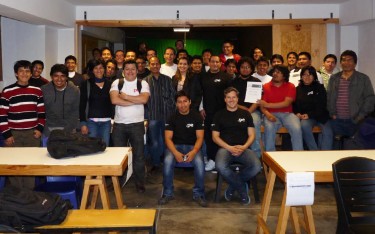
Teams, collaborators and staff of DAL2012 in Peru. Photo by Maru Panta http://visorperu.com/ for Escuelab. Used with author's permission.
Primer lugar grupo: Rememos. Proyecto: Monitoreo Ambiental. Integrantes: Antonio Cucho Gamboa, Renzo Arauco, Jordi Cook, Juan Luis Peña
Segundo lugar grupo: YS. Proyecto: Alerta Ciudad. Integrantes: Arturo Ochoa, Riccardo Mija, Franks Samamé, Paul Osorio Schuler
Tercer lugar grupo: #OTA. Proyecto: EducAya! Integrantes: Pedro Valverde, Jairo Gutierrez, Daphne Orihuela
First Place: Rememos. Project: Environmental Monitor. Members: Antonio Cucho Gamboa, Renzo Arauco, Jordi Cook, Juan Luis Peña
Second Place: YS. Project: City Alert. Members: Arturo Ochoa, Riccardo Mija, Franks Samamé, Paul Osorio Schuler
Third Place: #OTA. Project: EducAya! Members: Pedro Valverde, Jairo Gutierrez, Daphne Orihuela
Wingu (@desdewingu) tweeted about the Argentine winners:
@desdewingu: Tercer puesto
#DAL2012#Argentina para Mapa de asistencia a la víctima @pollatos @alegranza_a @malev pic.twitter.com/nlpQr6uq
@desdewingu: Third Place
#DAL2012#Argentina for assisting Map for victims @pollatos @alegranza_a @malev pic.twitter.com/nlpQr6uq
@desdewingu: Segundo puesto
#DAL2012#Argentina Grandes pequeñas ideas! pic.twitter.com/lp8krE2R
@desdewingu: Second Place
#DAL2012#Argentina Great Small Ideas! pic.twitter.com/lp8krE2R
@desdewingu: Ganador
#DAL2012#Argentina Puedo jugar solo. Proyecto para niños con autismo de @casaangelman pic.twitter.com/ALCLk2FZ
@desdewingu: Winner
#DAL2012#Argentina I can play alone. A project for children with autism by @casaangelman pic.twitter.com/ALCLk2FZ
In Uruguay, Data (@DataUY ) also tweeted its winners:
@DataUY Felicidades a Ombudsman Uy, Me Robaron, y Tu Huerta, los tres primeros proyectos ganadores del
#DAL2012 en#Uruguay
@DataUY Congratulations to Ombudsman Uy, Me Robaron [I Was Robbed], and Tu Huerta [Your Veg Patch], the first three winning projects from
#DAL2012 in#Uruguay
W3C Brazil followed suit (@w3cbrasil):
@w3cbrasil App brasileiro no @DAL hackathon latino americano http://i9bits.com.br/seuLixo/ @w3cbrasil
#dadosabertos
@w3cbrasil Brazilian App @DAL Latin American hackathon http://i9bits.com.br/seuLixo/ @w3cbrasil
#dadosabertos
The Bolivian Apps can be found on the Developing Latin America website, where you can also find all the other apps. A recount of tweets, photos and anecdotes from the second day of #dal2012 can be found in Storify.
Now all that is left is to wait a few more days before finding out the regional winners. In the meantime, the teams that have passed this stage find themselves making improvements to their apps in order to be best prepared for competing with the rest of the winners. We will continue to update!
Other related posts:
Developing Latin America 2012
What exactly is a hackathon and what is open data?
Hackathones in droves: How is a hackathon organised?
Developing Latin America Draws Near!
Day 1 of Developing Latin America 2012
What is web mapping? [es]
Brasil: Rio de Janeiro Demands Better Sanitation
Crowdmapping Water Contamination in Peruvian Indigenous Communities

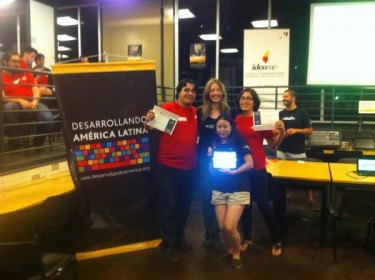
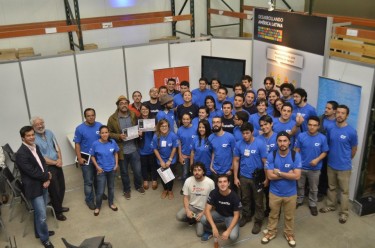
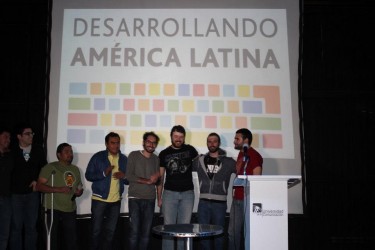
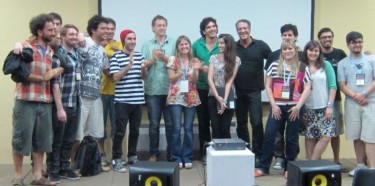







3 comments